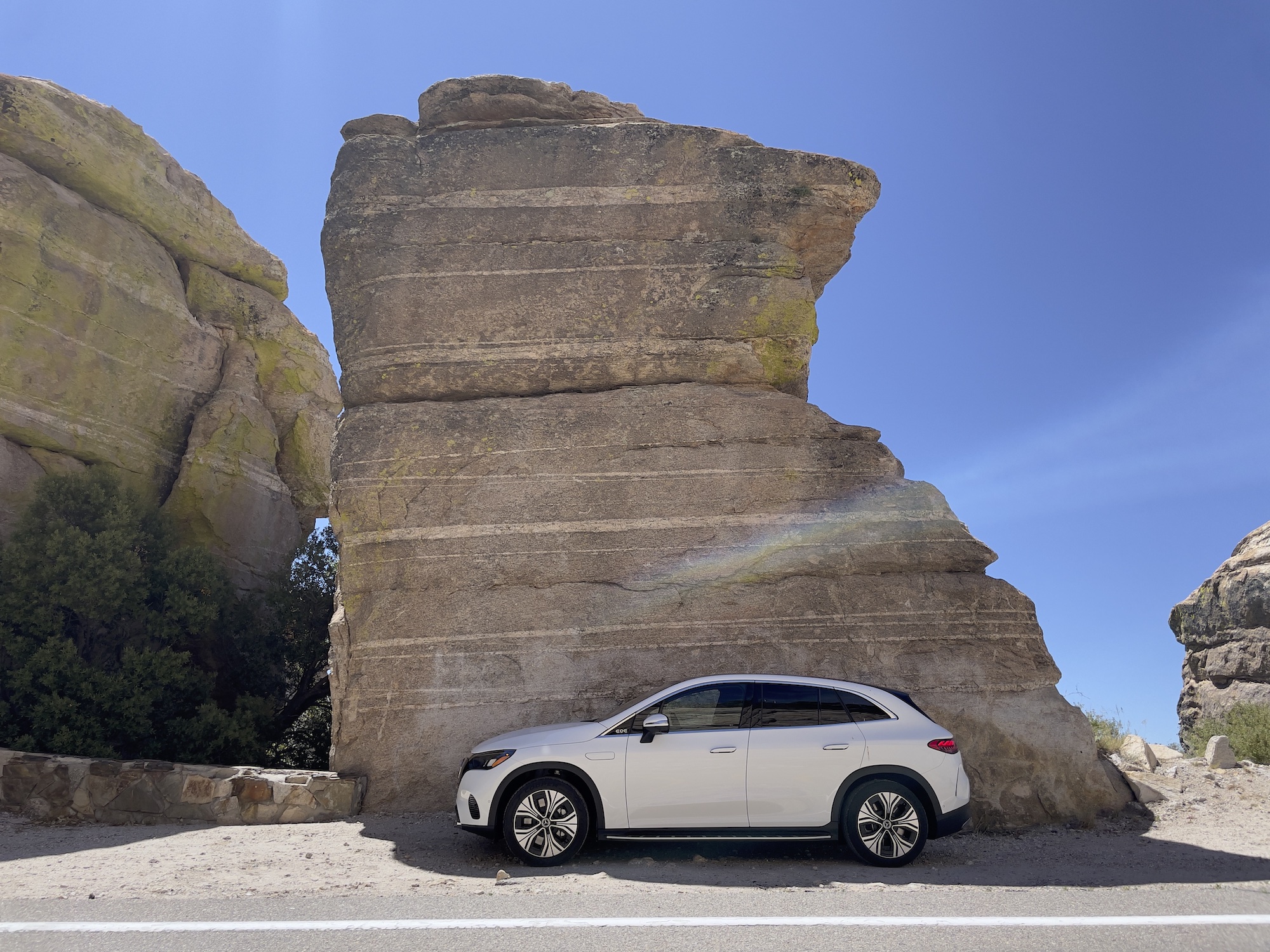The Station is a weekly newsletter dedicated to all things transportation. Sign up here — just click The Station — to receive the full edition of the newsletter every weekend in your inbox. Subscribe for free.
Welcome back to The Station, your central hub for all past, present and future means of moving people and packages from Point A to Point B.
Allow me a brief moment to toot my own horn!
Downey’s Dream Cars, a new reality TV show that combines cars, climate change, the future of mobility, startups and Robert Downey Junior, premiered June 22 on HBO Max. I had the opportunity to consult on the show and — plot twist — end up in a couple of episodes too (albeit briefly).
I do hope you check it out; and not just because I worked on it. The show explores ideas and solutions for how to lower our carbon footprint. I’m happy to say, it doesn’t boil down to buying a $58,940 EV, which was the average price in March 2023, according to Kelley Blue Book.
OK, shall we jump into the news of the week! Vamos.
Want to reach out with a tip, comment or complaint? Email Kirsten at [email protected]. You also can send a direct message to @kirstenkorosec.
Reminder that you can drop us a note at [email protected]. If you prefer to remain anonymous, click here to contact us, which includes SecureDrop (instructions here) and various encrypted messaging apps.
Micromobbin’
Just when we thought shared micromobility companies couldn’t iterate even more on e-scooter design, Bolt has gone and done it again.
Bolt (the European one, not the one that mysteriously disappeared) launched its sixth-generation e-scooter; and this one is packed with all the tech. What stood out to me was the IoT module with computer vision technology that allows the scooter to detect pedestrians and sidewalk riding. Once again, scooter ARAS for the win.
A few other notable features, includes an audio alert that says “thank you” to people who pick up a fallen scooter, a parking system and turn signals. And 70% of the aluminum comes from recycled sources.
Bolt will start deploying about 1,000 of these scooters in Lisbon, Riga and Tallinn by the end of July 2023.
In other news …
Bird said its expanding its services in Vienna, Austria after being awarded a new three-year permit.
Bosch eBike Systems is defining the software-defined e-bike. The company just released a range of new connectivity features for the 2024 model year to individualize the riding experience, including a new premium subscription that features and alarm and bike lock and a control unit that doubles as a customizable display screen.
Cycle has dropped a new cargo e-bike, the 20Fifty, designed especially for delivery. It’ll be available from July as a subscription starting at €129.00 per month, including maintenance service and insurance.
Think you want to buy your kid an e-bike? Just don’t. Here’s why.
Indian startups, not legacy OEMs, are the ones leading the electric two-wheeler revolution (paywall).
New York City is now letting electric micromobility vehicles into parks. This bit of news coincides with the expansion of the e-scooter program into Queens.
Zoomo has partnered with EAV to bring EAV’s cool-looking cargo e-bikes to the Zoomo platform. Zoomo offers e-bike subscriptions to couriers, to EAV’s inclusion in the platform is a huge level up.
— Rebecca Bellan
Deal of the week

Let’s talk about loans. And boy, this is a big one.
I’m talking about Ford (and its battery manufacturing partner SK On) landing a $9.2 billion loan from the U.S. Department of Energy. The funds will be used to build three battery factories in Kentucky and Tennessee that are expected to begin production in 2025.
Ford isn’t the only company to receive a conditional loan from the DOE to spur more clean energy — and specifically battery — manufacturing in the United States. Last year, a joint venture between General Motors and LG Energy Solution received a $2.5 billion loan to build three battery factories in the U.S.
Battery materials and recycling startup Redwood Materials has also received a $2 billion loan.
Other deals that got my attention this week …
BorgWarner agreed to buy the electric hybrid systems business segment of Italy-based Eldor Corp. for €75 million ($80M).
Cargobot, a Miami-based digital freight company, raised $6 million in a Series A round led by BPBI with continued participation from its majority investor Total Management 2 Inc.
Guardian Agriculture, an agricultural eVTOL company, raised a $20 million in a Series A round led by Fall Line Capital.
Rivian acquired Iternio, the company behind ABetterRouteplanner, a popular route-planning app used by EV drivers. Financial terms were not disclosed.
Tesla plans to acquire a German-based company called Wiferion that sells wireless charging systems for autonomous mobile robots and autonomous guided vehicles, The Robot Report said, citing an unnamed source.
Notable reads and other tidbits

ADAS
Tesla shareholder and advocate Ross Gerber along with critic Dan O’Dowd recorded video of a ride in a Model S using its so-called Full Self-Driving (FSD) beta software. The plan, I presume, was for Gerber to convince O’Dowd, a billionaire who has called for a ban on the product, that FSD was safe. Welp, in this video you can see that didn’t happen and now it’s making its way around Twitter and other social media.
Specifically, the vehicle runs a stop sign and Gerber takes over, preventing a crash with another vehicle (and please readers, as someone who has repeatedly tested FSD, don’t try and argue it wasn’t engaged. It’s clear).
My question: will this video add momentum to efforts to regulate or restrict the use of FSD or will it simply fade into the ether?
Autonomous vehicle tech
Cartken says its sidewalk bots have surpassed more than 25,000 monthly deliveries. The company also said that it has reached new levels of autonomy that require “basically no intervention” and that make robot delivery profitable.
Cruise developed (and now launched) an Android app to support its robotaxi service. Apparently, more than 20% of people on its waitlist are Android users.
Kodiak Robotics signed a deal with Loadsmith, a marketplace that connects shippers and carriers, to put 800 Kodiak-equipped trucks on its platform. Reminder: In May 2022, Loadsmith secured 350 autonomous trucks through TuSimple, but canceled its order a few months later.
Parallel Domain, a San Francisco-based startup, launched a new API called Data Lab that gives machine-learning engineers control over dynamic virtual worlds to simulate any scenario.
TuSimple keeps ramping up in China. The company said it completed a series of fully autonomous semi-truck runs on public roads in China without a human present in the vehicle and without human intervention.
Electric vehicles, batteries & charging
China’s CATL signed a deal with Bolivia to tap the country’s lithium reserves.
Helixx is using Siemens’ open digital platform to design a highly-automated ‘factory in a box’ that can be built anywhere to assemble smaller, low-cost EVs, starting in large Asian cities. Careful, Helixx. Sounds a bit like Arrival’s microfactory plan.
Hyundai outlined an updated EV plan during its investor day, including plans to spend about $28.1 billion over the next decade on electrification, including $7.45 billion for batteries. The company also said it will launch a new EV platform that will replace the one currently on the Ioniq 5.
Fisker kicked off deliveries in the U.S. customers by handing over 22 vehicles Fisker Ocean One launch edition vehicles to customers.
Tesla’s North American Charging Standard (NACS) is gaining more ground. Rivian became the latest automaker to adopt NACS, following similar moves by Ford and General Motors. State governments are also getting on board. Texas said it will require EV charging companies to include Tesla’s North American Charging Standard (NACS) and the Combined Charging System (CCS) standard in order to qualify for a state program to electrify highways through federal funds. And, it looks like Washington might be next.
Volkswagen had a battery breakthrough. TC reporter Tim De Chant digs into the details and explains what it means for the automaker and industry.
Gig economy
Uber is doubling its advertising efforts. The ride-hail giant is partnering with Omnicom Media Group in a data collaboration that combines Uber’s mobility and delivery insights and audience data with Omnicom’s operating system.
In-car tech
Google is facing increased scrutiny in Germany as the country’s antitrust watchdog considers banning the company’s automotive services unit from bundling navigation and other in-car services.
OK, Forcite isn’t working on “in-car” tech, per se. But the startup has developed a smart helmet that integrates with an app and someday maybe even the motorcycle itself. Contributor Tim Stevens has the inside story on the company and how it’s seeking the success that one-time Indiegogo darling Skully squandered.
Polestar formed a joint venture with Xingji Meizu, a mobile phone and consumer electronics company, to build an operating system for Polestar cars sold in China. In the rest of the world, Polestar integrated Google’s Android Automotive OS into vehicles to power its infotainment systems.
Stellantis and Hon Hai Technology Group (more commonly known as Foxconn) created a joint venture called SiliconAuto that’s dedicated to designing and selling semiconductors to supply the automotive industry, including Stellantis, starting in 2026.
People
Chemix, the Silicon Valley battery developer, hired Praveen Sharma, a former Tesla operation leader, as its Chief Operating Officer.
Einride hired Henrik Green to head up its autonomous technologies division. Green previously served as chief technology officer and chief product officer at Volvo Cars.
Grant Goodale, who co-founded of trucking marketplace startup Convoy with Dan Lewis, is leaving his executive position and will transition to an advisory role.
Lin-Hua Wu, the former VP of global communications at Google, was hired as senior vice president and chief communications officer at GM.
What’s in my driveway

Image Credits: Kirsten Korosec
I occasionally test EVs and plug-in hybrids — and sometimes ICE vehicles if it has compelling tech. What’s in my driveway this week? The 2023 Mercedes EQE 350+ SUV.
Did you even know that the EQE had an SUV version? Well now you do. Mercedes has the flagship EQS, the EQS SUV and the EQE sedan. The EQE SUV sort of slots in the middle as a compact SUV.
The exterior is a bit meh for me (cute blob is what one neighbor said). And don’t even get me started on the $650 optional illuminated running boards that successfully got in my way every time I stepped into or out of the EV. (Mercedes tells me the running boards do improve efficiency).
However, the interior and performance of the EQE SUV is where this vehicle really shines. Mercedes’ MBUX infotainment system is one of the better on the market and it keeps improving. And it seems that finding and navigating to EV chargers in navigation has also improved!
One new item worth flagging: the EQE SUV is also equipped with an ADAS system that will automatically change lanes without driver intervention. Just don’t expect it to ever pass on the right.
Rivian adopts Tesla charging standard, Cruise adds Android and Ford lands a $9.2B loan by Kirsten Korosec originally published on TechCrunch
Source : Rivian adopts Tesla charging standard, Cruise adds Android and Ford lands a $9.2B loan










